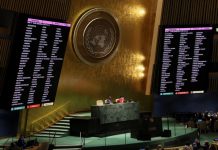President Joe Biden, announcing major changes in his foreign policy priorities in his first speech at the State Department, said “America is back. Diplomacy is back.” He issued stern warnings to Russia and Myanmar, announced stopping support for the Saudi-led war in Yemen, freezing troop withdrawal from Germany and increasing the number of refugee admissions.
He told the State Department staff that “his administration is going to empower you to do your jobs, not target or politicise you.”
“America is back. Diplomacy is back,” Biden said before his speech. “You are the center of all that I intend to do. You are the heart of it. We’re going to rebuild our alliances.”
In his major shift in policy on Russia, President Biden warned his Russian counterpart Vladimir Putin to immediately release opposition leader Alexei Navalny. Protests have broken out throughout Russia following Navalny arrest. And thousands of protesters have been arrested. Navalny was detained in Moscow last month and sentenced to more than two years in prison.
“I made it clear to President Putin, in a manner very different from my predecessor, that the days of the United States rolling over in the face of Russia’s aggressive actions, interfering with our election, cyber attacks, poisoning its citizens, are over,” said Biden.
“We will not hesitate to raise the cost on Russia and defend our vital interests and our people,” he added.
He called on military leaders in Myanmar to relinquish power, release detainees and lift a telecommunications blackout, and said that he was prepared to “impose consequences on those responsible.”
President Biden makes a little mention of China and said the US will confront Beijing’s “economic abuses, counter its aggressive, coercive action to push back on China’s attack on human rights, intellectual property, and global governance.” But some controversial issues like nuclear negotiations with Iran and the continuing conflict between Israelis and Palestinians, he didn’t mention at all.
President Biden listed issues where he said he would reverse Trump’s policies or set his priorities, including scrapping the former president’s plan to withdraw 9,500 of the roughly 34,500 US troops stationed in Germany. The country hosts key American military facilities like the Ramstein Air Base and the headquarters for US European Command and U.S. Africa Command.
He also signed a presidential memorandum that addresses protections for lesbian, gay, bisexual, transgender and queer individuals worldwide. The memorandum, which builds off guidance the Obama administration issued in 2011, directs State Department officials and other federal officials working abroad to ensure that US diplomatic and foreign assistance efforts promote and protect LGBTQ rights.
Biden also announced plans to increase the cap on the number of refugees allowed into the United States to more than eight times the level at which the Trump administration left it. Trump reduced the number to only 15,000. Biden would raise it to 125,000.
Through an executive order, Biden also called for rescinding Trump-era rules that resulted in excessive vetting of applicants, expanding capacity for adjudicating applications for refugee applications, and other steps.
Biden announced appointing a longtime US diplomat for the Middle East, Tim Lenderking, as his special envoy in Yemen. The move comes as Biden is searching for a diplomatic end to the Saudi Arabia-led military campaign that has deepened humanitarian suffering in the Arabian peninsula’s poorest country.
Lenderking, a career foreign service member, has served in Saudi Arabia, Kuwait and other countries in the Middle East and elsewhere.









